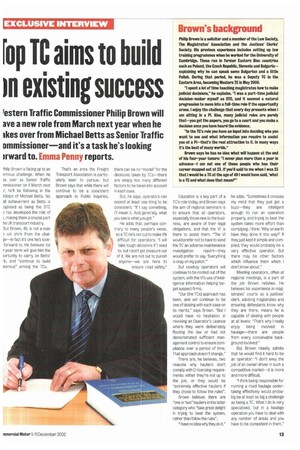fop TC aims to build in existing success
Page 13

If you've noticed an error in this article please click here to report it so we can fix it.
!es-tern Traffic Commissioner Philip Brown will ave a new role from March next year when he ikes over from Michael Betts as Senior Traffic ommissioner—and it's a task he's looking irward to. Emma Penny reports.
'hilip Brown is facing up to an mous challenge. When he as over as Senior Traffic nmissioner on 4 March next [1-, he'll be following in the tsteps of Michael Betts. No all achievement as Betts is ognised as being the STC ) has developed the role of ii, making them a crucial part he UK transport industry. But Brown, 49, is not a man ) will shirk from the chal;e—in fact it's one he's lookforward to. He believes his r-year term will give him the )ortunity to carry on Betts' "k, and "continue to build isensus" among the TCs.
That's an area the Freight Transport Association is particularly keen to pursue, but Brown says that while there will continue to be a consistent approach to Public Inquiries, there can be no "model" for the decisions taken by TOs—there are simply too many different factors to be taken into account in each case.
But, he says, operators can expect at least one thing to be consistent: "If I say something. I'll mean it. And generally what you see is what you get."
He adds that, perhaps contrary to many people's views, as a TC he's not out to make life difficult for operators: "I will take tough decisions if I need to, but I don't get pleasure out of it. We are not out to punish anyone—we are here to ensure road safety." Education is a key part of a IC's role today, and Brown says the aim of regional seminars is to ensure that all operators, especially those new to the business, are aware of their legal obligations, and that the VI is there to assist them: "The VI would prefer not to have to send the TC an adverse maintenance investigation report—they would prefer to say. 'Everything is okay on my patch.'" But cowboy operators will continue to be rooted out of the system, with the VI's use of intelligence information helping target suspect firms.
"Our [the TOs1 approach has been, and will continue to be one of dealing with each case on as merits," says Brown. "But I would have no hesitation in revoking an Operator's Licence where they were deliberately flouting the law or had not demonstrated sufficient management control to ensure compliance over a period of time. That approach doesn't change."
There are, he believes, two reasons why hauliers don't comply with 0-licensing requirements: either they're not up to the job, or they would be 'extremely effective hauliers if they chose to follow the rules".
Brown believes there are 'one or two" hauliers in this latter category who lake great delight in trying to beat the system, rather than follow the rules".
"I have no idea why they do it," he adds. "Sometimes it crosses my mind that they just get a buzz—they are intelligent enough to run an operation properly, and trying to beat the system takes more effort than complying. I think: 'Why on earth have they done it this way?' If they just kept it simple and complied, they would probably be a very effective operator. But there may be other factors which influence them which I don't know about."
Meeting operators, often at regional meetings, is a part of the job Brown relishes. He believes his experience in magistrates' courts as a justices' clerk, advising magistrates and ensuring defendants know why they are there, means he is capable of dealing with people at all levels: "That's why I really enjoy being involved in haulage—there are people from every conceivable background involved."
But Brown readily admits that he would find it hard to be an operator: "I don't envy the job of an owner-driver in such a competitive market—it is more and more difficult.
"I think being responsible for running a road haulage undertaking effectively would probably be at least as big a challenge as being a TC. What I do is very specialised, but in a haulage operation you have to deal with any number of areas and you have to be competent in them,"
























































































































































